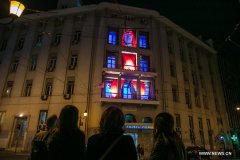South African child in HIV remission without drugs since 2008: U.S. NIH
WASHINGTON, July 24 (Xinhua) -- A nine-year-old South African child who was diagnosed with HIV infection at one month of age and received anti-HIV treatment during infancy has suppressed the virus without anti-HIV drugs for eight and a half years, the U.S. National Institutes of Health (NIH) said Monday.
"This new case strengthens our hope that by treating HIV-infected children for a brief period beginning in infancy, we may be able to spare them the burden of life-long therapy and the health consequences of long-term immune activation typically associated with HIV disease," Anthony Fauci, director of the National Institute of Allergy and Infectious Diseases (NIAID), part of the NIH, said in a statement.
The NIAID funded the clinical trial in which the child received treatment and follow-up monitoring.
This case appeared to be the third reported instance of sustained HIV remission in a child after early, limited anti-HIV treatment.
Previously, the "Mississippi Baby," born with HIV in 2010, received anti-HIV treatment beginning 30 hours after birth, stopped therapy around 18 months of age, and controlled the virus without drugs for 27 months before it reappeared in her blood.
In 2015, researchers reported that a French child who was born with HIV in 1996, started anti-HIV therapy at age three months, and stopped treatment sometime between ages 5.5 and 7 years, continued to control the virus without drugs more than 11 years later.
In the latest case, the child had very high levels of HIV in the blood when diagnosed with HIV infection in 2007, but antiretroviral therapy starting at about nine weeks of age and ending after 40 weeks was found to suppress the virus to undetectable levels.
When the child was nine and a half years old, investigators detected a reservoir of virus integrated into a tiny proportion of immune cells, but otherwise found no evidence of HIV infection.
"The researchers detected a trace of immune system response to the virus, but found no HIV capable of replicating," the NIH statement said.
"The scientists also confirmed that the child does not have genetic characteristics associated with spontaneous control of HIV, suggesting that the 40 weeks of [antiretroviral therapy] provided during infancy may have been key to achieving HIV remission," it said.
"We believe there may have been other factors in addition to early [antiretroviral therapy] that contributed to HIV remission in this child," said Caroline Tiemessen, head of cell biology at the Center of HIV and STIs (sexually transmitted infections) of the National Institute of Communicable Diseases in Johannesburg, whose laboratory is studying the child's immune system.
"By further studying the child, we may expand our understanding of how the immune system controls HIV replication," Tiemessen added.















